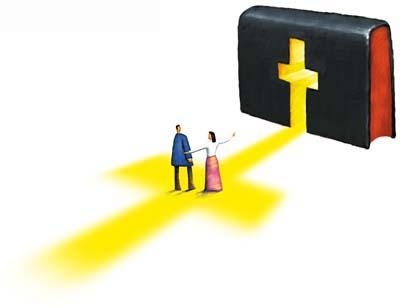Have
you ever read the Bible? Most likely not. You've probably read Psalms, some
Pauline letters and a few of the Gospels. Oh, and I bet you've read Proverbs,
too. The Bible is a very interesting book in the Christian sub-culture. In many
ways we love our Bible, but we never open its pages. If we hear of a preacher
who might be "misrepresenting" the Bible we rally in arms to attack
that persons character. We cry out against him for his offense to God's Word,
and yet most Christians have little knowledge of what their Bible actually
says. Christians from all corners will defend the cause of having the Bible
represented accurately, but no one will take the time to read it for
themselves. What does this say, Christian?
I
remember when I first got saved, as a teenager, one of the first things I did
was read the New Testament. I went to a private school, so I wasn't teased for
bringing my Bible to class, but I wasn't exactly the norm, either. I read the
Bible cover to cover three times in High school. As an adult I led Bible studies
and used the Bible to minister to the unsaved. I loved the Bible. I studied the
Bible. I taught the Bible, and I shared the Bible. But even with all this, I
still did not know enough of the Bible to defend myself against rational
opposition.
The
truth is that it cannot be done. When we look at the Bible rationally we
realize the Bible has issues.
I.
Why We Need The Bible
For
all our lackadaisical attitude toward the Bible in our personal spirituality,
in the community of believers the Bible is the benchmark of normative Christian
behavior. A church that decides to diminish the importance of the Bible in its
customs, preaching, and teaching might as well separate itself from the idea of
Christianity all together. This is not an argument for the way things ought to
be, but is simply a statement of the way things are.
Given
this reality, the Bible does have to be taken seriously. Technically speaking,
Christianity does not require a Bible. The word, "Christian" is
simply an affirmation that Jesus is Lord. As long as a person submits himself
to Jesus then the appellation of Christian is deserving, but to claim this title
in the face of opposition to the Bible carries with it a burden that seems hypocritical
and duplicitous.
This
reality causes us to ask, "What is so important about the Bible?" Why
do we measure a persons faith according to our allegiance to a book? What is it
about the Bible that gives Christians the right to judge another persons
spiritual beliefs as being either Christian or non-Christian? Does not the
importance of the Bible in modern Christianity seem more indicative of legalism
than the authentic spirituality Jesus taught in the Bible? If my faith is between
me and God, why would I need a Bible?
The
Bible is the first document that the first believers sought to define their
faith through. Jewish followers of Jesus read the Scriptures and applied those
Scriptures to Christ (1 Cor. 15:3). There was no New Testament, but there was
an Old Testament, or to put better, there was a Torah, the Prophets, and Wisdom
literature that would later comprise the Old Testament that Jews adhered to in
various ways as a canon, and there was the teachings of the Apostles, which
would be carried on to the Epistles (Acts 2:42). So the Bible is in a very real
way the earliest and most authentic representation of what Christianity is and
was to the first believers. Just as the Declaration of Independence or the
Mayflower Compact is crucial for the understanding and practice of American
democracy, so the Bible is critical for the understanding and practice of the
Christian faith.
But
there is more. All the above analysis' consider instrumental or utilitarian
reasons why the Bible is necessary for the Christian faith. None of that gives
us any reason why a person should consider the Bible as being spiritually
significant for their faith today, as Christians. Apart from the words,
sentences, paragraphs, literary genres, and books of the Bible, the Bible is
more than an instruction manual. In fact, I would say that the Bible is needed
for Christians today exactly because it is NOT an instruction manual, but a
witness. The Bible is an invitation to an experience. The same experience that
believers had thousands of years ago which transformed their lives into the
image of the Risen Lord (Col. 1:3-6). The Bible is a witness of the Gospel (Rom
1:2), and the Gospel is the core principle of a community that calls itself the
People of God (1 Pet. 4:17).
For
Christians who have an experience of the risen Lord that changes their life the
Bible becomes necessary because it is an invitation to continue in that same
experience. The Christian needs the Bible, because the Bible doesn't just
"teach" the Gospel, it gives the Gospel life in the spiritual
practice of the believer. In this sense, the believer does not NEED the Bible,
but rather gets to have the Bible. Just as a person does not NEED a recipe to
eat dinner, but is so thankful for having one to create the experience of
eating like a civilized person. Just the same the Bible creates the experience
of the Gospel for the spiritually inclined. Technically one does not need it in
the sense of oxygen or water, but to live to one's full potential in Christ it
would be foolish to ignore it.
This
being the case. What happens if we cannot trust the Bible? If the Bible is so
intimately linked to the spiritual development of the Christian faith, then
what do we say of Christianity if the Bible is "debunked"? What would
it matter if we could prove with certainty that Jesus rose from the dead, that
the God of Abraham exists, and that our universe was created and designed by a
divine hand? If the Bible was untrustworthy then no hope for Christianity would
exist apart from the first generation of believers.
Further, religions would've
developed which most likely mimicked the teachings of Paul or Jesus and perhaps
in a very real way the "spirit" of Christianity would have persisted,
but it's impossible to say what would really happen. Just as if, there were no
Declaration of Independence or Mayflower Compact we could be sure that most
likely America would be completely different, if non-existent, to the point
that we would not even want to call it America, but it does not necessarily mean
that American democracy would be eradicated. Hence, we can kill Christianity if
we kill the Bible, but the Gospel is something that could technically live on
without Christianity. The Gospel exists beyond the Bible, just as democracy exists beyond our founding documents. And just as our democracy may still exist even if we had no founding documents, so too, our religion could still exist without the Bible, but the kind of religion it would be, would be radically different then the one we have to such a point that it would be difficult to imagine it being effectively "Christian".
The
reality is that the Bible is the most easily verifiable relic we
have to prove or disprove the Christian faith. If it can be shown to be a cause
of cognitive dissonance, or to be adding complexity or prohibiting the practice
of maintaining a clear conscience then we would have good reasons to think that
the Bible is unreliable, and that the Christian faith is no longer sufficient
for today's spiritual believers. So a Christian can in full confidence engage in
the intellectual understanding of his Holy Text understanding that even if such
a text is discredited the Gospel itself can remain unaffected. And it can be
argued that in the interest of faith and the Gospel that such an undertaking is
of a pure heart and a clear conscience. We have the obligation as believers to
test ourselves to make sure that what we believe is in line with the Gospel,
not the Bible.
Philippians 2:22 - But you
know that Timothy has proved himself, because as a son with his father he has
served with me in the work of the gospel.
1 Thessalonians 2:4 - On the
contrary, we speak as men approved by God to be entrusted with the gospel. We
are not trying to please men but God, who tests our hearts.


No comments:
Post a Comment